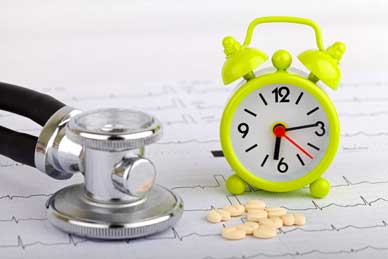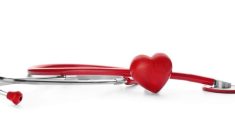Take Your Blood Pressure Medication Before Bed for Best Results
A new study finds blood pressure medication may be more effective and even prevent death due to cardiovascular disease when taken at night.
Treating hypertension, or high blood pressure, is a challenge for many health care workers. While there are many medications available, it can be difficult to find the right combinations and doses that will keep blood pressure under control with minimum side effects. A new study suggests that the time when people take their blood pressure medication may be an important factor in hypertension control.
What Causes Hypertension?
There are several causes of hypertension. As people age, many develop atherosclerosis, or hardening of their blood vessels. This keeps their vessels from stretching to accommodate changes in blood volume, which leads to higher pressure in the circulatory system. Second, many people also develop lipid deposits in their arteries as they age, which further constricts their blood vessels and raises pressure.
One last and highly-treatable factor in blood pressure is the Renin-Angiotensin-Aldosterone System, or RAAS. This system releases hormones that control the excretion of fluids and electrolytes. Retaining fluid and electrolytes as a result of abnormal activity in the RAAS is a major cause of hypertension. For this reason, this system is the target of the most commonly-used classes of blood pressure medication, including ACE inhibitors and angiotensin receptor blockers (ARBs).
The Timing of Blood Pressure
 The RAAS is tightly-timed and runs on a circadian rhythm, which means that hypertension also has a distinct 24-hour cycle. In a healthy person, blood pressure rises shortly before waking as the RAAS goes into high gear. It reaches a peak around noon and then slowly falls until bedtime. It reaches an all-time low when people finally fall into deep sleep.
The RAAS is tightly-timed and runs on a circadian rhythm, which means that hypertension also has a distinct 24-hour cycle. In a healthy person, blood pressure rises shortly before waking as the RAAS goes into high gear. It reaches a peak around noon and then slowly falls until bedtime. It reaches an all-time low when people finally fall into deep sleep.
However, in people with hypertension, especially hypertension that doesn't respond to medication, blood pressure fails to fall at night. People with higher nighttime blood pressure, called non-dippers, are more likely to suffer heart attacks and strokes, especially late at night and in the early morning.
Can Timing Blood Pressure Medication Help?
In a recent chronobiology study, people with hypertension were followed for more than five years. Some took their blood pressure medication in the morning, which is typical, while others took it before bed.
The people who took their blood pressure medication at night had lower blood pressure. In addition, they had one-third the amount of heart attacks and strokes. This is not the only study suggesting that taking blood pressure medication at night has health benefits. Another recent study found that people who take their medication at night have a lower risk of developing diabetes, a common complication in hypertensive people.
Chronopharmacology and Health Care
Chronopharmacology, a sub-discipline of chronobiology, is one of the fastest growing fields in medicine. New studies are published almost every week suggesting that when we take medication can have a huge effect on treatment, side effects and even death rates. Circadian rhythms dictate almost every cell process, including how we use and metabolize medications.
One in three adults, or about 70 million Americans, suffer from hypertension. Of these people, only about half have their condition under control. These new studies on chronopharmacology and blood pressure medication offer hope that people may find better control of a difficult-to-treat disease and lead longer, healthier lives.





